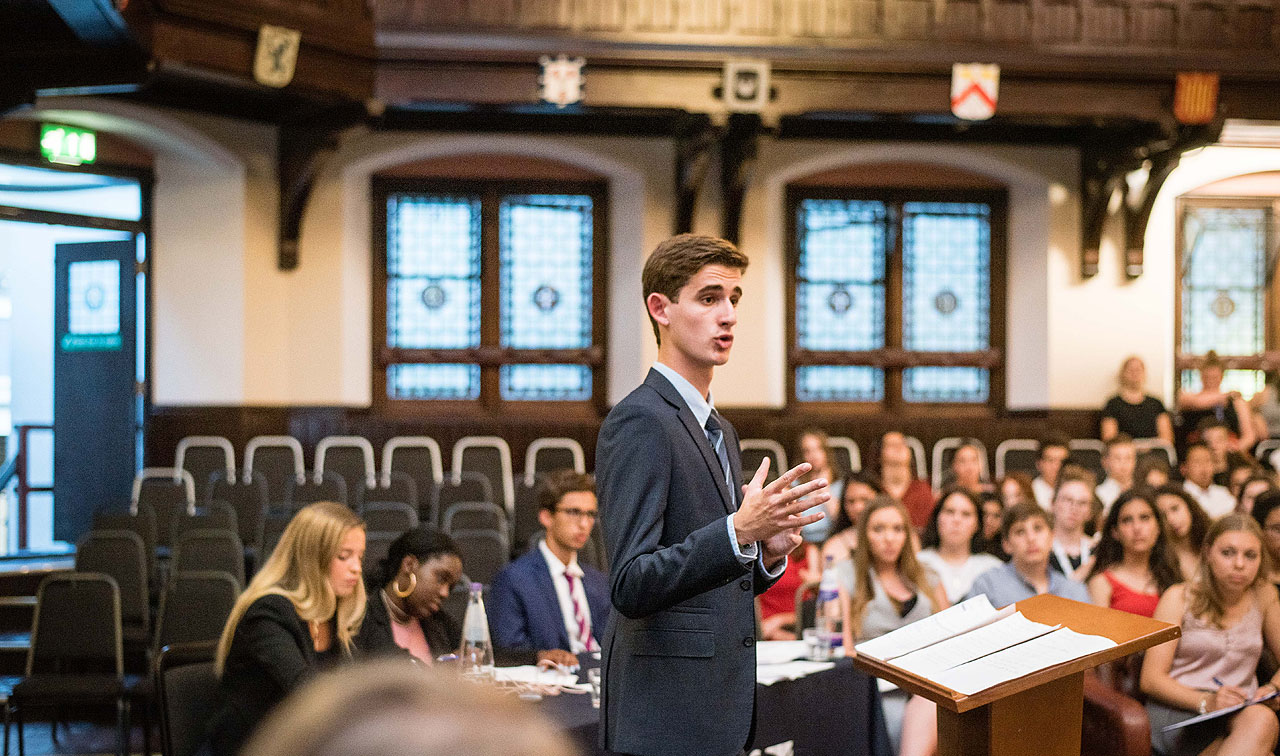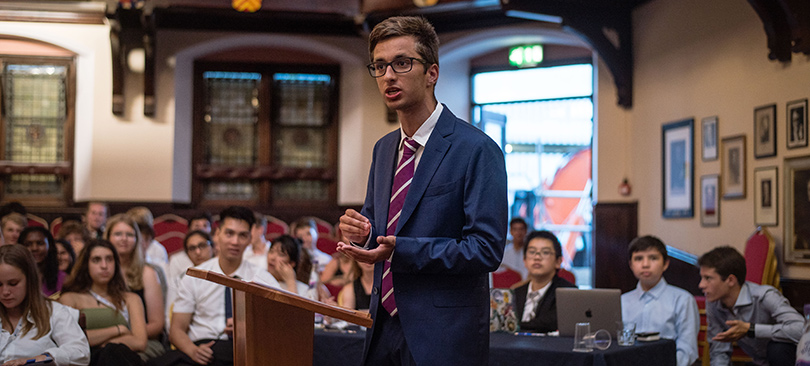Let's Debate, Why Debate?
It is a rare occurrence that one can enter the classroom as a student and challenge the teacher. Yet, in debate, with a respectful and well-posed argument, it’s welcomed!
It is a rare occurrence that one can enter the classroom as a student and challenge the teacher. Yet, in debate, with a respectful and well-posed argument, it’s welcomed!

In a reality where the news is available at our fingertips practically in real-time, it’s never been more relevant to encourage the generation of tomorrow to question that which is going on around them. But the benefits of debate are more far-reaching than one would first consider and for young adults, at an age where key decisions regarding their future are being made and aspects of their character formed, why do we consider debate to be an invaluable tool to help the future generation continue to grow.

How Debate Can Benefit Your Studies … And Beyond!
Studying debate provides young adults with the skills to successfully tackle the world around them and intelligently question that which they believe to be true or false. Debate doesn’t only afford the opportunity to work on public speaking, but also offers an engaging and relevant output to practice structuring an essay; providing a clear argument, evidence to support your claims and convincing your audience to agree with you. These skills offer a strong academic foundation to build on when writing the essay element of the IB program, in exam situations when structuring a paper under time constraints and presenting as part of final exams (to offer but a few examples). In addition, the academic skill set gained as part of debate is something that will benefit all students at university level. Beyond this and looking at the wider picture, debate provides a platform for young adults to explore how they wish to present themselves in university applications and in the future, interviews with potential employers. The competition for places at top universities is becoming ever more fierce and we strongly believe that debate offers the tools to ensure they have the edge and stand out from the crowd.
More importantly, studying debate in an international setting gives young adults the confidence to express their opinions in a coherent, considered and structured way whilst also affording their fellow peers the time and respect that they deserve in voicing their opinions also. Debate students are encouraged to remember they are not arguing, they are debating, attacking the argument and not the person. A distinction, which we find, stays with them long after they’ve left the classroom.
Young people are exposed to a number of different opinions and view points; some from their parents, some from their education, the media and their peers. However, debate offers young people the opportunity to challenge their own opinions along with the opinions and beliefs of others in a safe and educational environment. Debate teaches participants to engage in healthy discussion, to think more critically about their sometimes inherited opinions and to really understand their origins and their validity by using facts and personal objectivity as well as life experience to defend, change or present their argument.
In what other forum are young people offered the floor to debate world issues? As well as giving young people invaluable academic and social skills, debate exposes young people to issues that affect us all and need to be discussed, solved and challenged. Young people gain knowledge of and develop opinions on world wide issues that include economics, politics, religion, environment, culture, censorship and education, to name but a few. - Debating Matters, a company based in London, offers a list of topics that show the diversity of subjects often covered in debating: Debating Matters List of Debating topics
In a world where we desperately need healthy debate in order to challenge opinions and create change for the good, what better skill set to offer young people as leaders of the future than Debate.
Why British Parliamentary Debate?
We are often asked in what format debate is taught at ISSOS and with a number of options available, why we choose to practice British Parliamentary Debate over any other. We are proud to have had some of the best debaters not only in the UK, but worldwide who have guided and inspired our students over the last 10 years. Our teachers have competed with successes in both the European and World University Debating Championships (to name but a couple of the accolades they hold), both of which are conducted in British Parliamentary format. This form of debating style allows 8 people (4 teams of 2) to participate in the final debate (American Parliamentary Debate only allows 4 participants and Asian/Australia allow 6) which means we can offer this exciting opportunity to as many students as possible. BPD (British Parliamentary Debate) also encourages our students to use their own knowledge and perspective on the topics at hand, banning the use of electronic devices and books to research and allowing the students only the option of discussion with their partner. Finally, BPD is conducted in a spoken style, which is accessible to all and allows for an all-inclusive environment for anyone who wishes to participate.

Students at ISSOS are offered the opportunity to debate in the St Andrews University Debating Chamber, once home to the Scottish Parliament, and The Cambridge University Debating Chamber, where Winston Churchill, The Dala Lama and many famous politicians, activitits and alumni students have spoken. In Yale students can follow in the footsteps of one America's best debating societies, Yale University Debating Society. All of this whilst engaging in the British Parlimentary format.
Where to study Debate
ISSOS offers debate at all three of ours campuses as we believe it to be an invaluable academic and social skill set. For three weeks students can engage in the art of debate whilst being taught and guided by world-class debate coaches.
Many high schools and international schools have debate societies and in some cases, we have had students who have started a debating society at their own school where one had not previously existed. Scotland has a great schools debate network, with an annual debating tournament held in Scotland for particiating schools called The Donald Dewar Memorial Debating Tournament and ISSOS can assist anyone wanting to set up a debating society in their school with materials and links to contacts in most countries.
Many students choose to continue with debate when they leave ISSOS or school and a number of students have gone on to debate at university level. Universities in the UK and US have a robust debate scene, with most having their own debate team that in turn goes out and competes against other US or UK universities. Many also compete on the world stage in World University Debate Championships or European Debate Championships.
We are proud to offer debate at ISSOS, with many students choosing to return to us and study this academic year after year. And if you’re still unsure of the benefits, we’d be happy to debate it with you!
Some Thoughts on Debate From Our Teachers…
“ In many mainstream educational settings, students are often not able to question or challenge the ideas presented to them; debate gives them a platform do just that, but in a productive and structured way. We don't argue, we debate, and that distinction is one that students carry with them after leaving the classroom. I would regularly hear continued conversations at tables in the cafeteria as debate students excitedly shared the day's topics with their friends, referencing both sides of the issue and wanting to continue learning on their own time.”
Emily Ray, Debate Teacher, St Andrews 2016
Debating teaches lots of valuable skills - logic, awareness, argument structure - but most importantly, it helps young people realise that their opinions and ideas have a place in the world. When you know, for a fact, that you are expressing yourself coherently and respectfully, you gain self-belief because you realise there is no reason that somebody else shouldn't be affording you the respect you deserve. It's not just about sounding good and speaking well - debating is one of the few activities that builds genuine self-confidence.”
Hannah Cogan, Debate Teacher, St Andrews 2015